





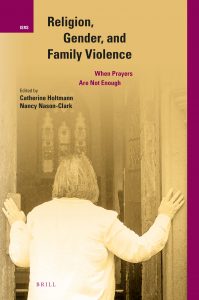
Religion, Gender, and Family Violence: When Prayers are not Enough (Brill, 2018), edited by Catherine Holtmann and Nancy Nason-Clark.
The chapters of this edited collected have been written from multiple disciplinary perspectives (sociology, religious studies, law) and are based on research within diverse religious traditions including Christianity, Islam and Judaism, as well as new religious movements. Similarities and differences between traditions are highlighted based on empirical research which shows how people actually deal with family violence in different contexts. The book also addresses some of the larger historical and political backgrounds that impact the experiences of family violence amongst ethno-religious minorities. The lives of religious victims and perpetrators of family violence are considered, as well as the responsibilities of religious leaders, congregations and secular professionals in addressing this widespread social problem.


This book recounts stories from the point of view of the men who act abusively. Interwoven with this rich and colorful portrayal of the journey of abusive men, we bring twenty years of fieldwork with survivors and those who walk alongside them as they seek safety, healing and wholeness for themselves and their children. The men’s stories are countered by reality checks from their own case files and those professionals who have worked with them.
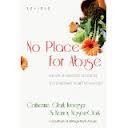
Domestic violence is a leading cause of injury and death to women worldwide. Regrettably, the church is not immune to this problem. Numerous studies suggest that incident rates among active churchgoers are nearly the same as those among the general populace. In this thoroughly revised and updated edition, Catherine Clark Kroeger and Nancy Nason-Clark share with readers their years of experience in listening to the voices of women from around the world and especially to those within the church.
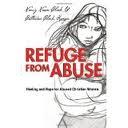
Nason-Clark and Kroeger know the pain of women who have been abused, especially the unique pain of Christian women who thought it couldn’t happen to them. Their advice is solid, backed up by Nason-Clark’s professional expertise as a sociologist and Kroeger’s as a biblical scholar. Together they supply step-by-step advice needed to start the healing journey and biblical insights to nourish the soul and sustain the spirit on the path to wholeness.
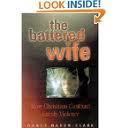
Family life is often a place of violence, especially violence against women–in Christian homes as well as in secular ones. Nancy Nason-Clark’s sociological investigations allow her to analyze this problem and to reveal how Christian communities respond to family violence in positive ways. She also to suggests how church and secular agencies can cooperate for even more effective action.

Each of the authors contributing to this volume believes that it is imperative that followers of Jesus and their spiritual shepherds respond to the cries for help. To respond well necessitates both knowledge and a willingness to act. This book represents a diversity of perspectives, with the hope that each will in some way advance our understanding of the complexity of domestic violence issues in our midst-within our churches and the communities where our churches minister.
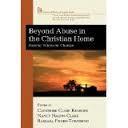
Each of the authors contributing to this volume believes that it is imperative that followers of Jesus and their spiritual shepherds respond to the cries for help. To respond well necessitates both knowledge and a willingness to act. This book represents a diversity of perspectives, with the hope that each will in some way advance our understanding of the complexity of domestic violence issues in our midst-within our churches and the communities where our churches minister.

Based on research projects conducted over ten years through the Muriel McQueen Fergusson Centre for Family Violence Research at the University of New Brunswick, Understanding Abuse profiles the work done by researchers of issues related to family violence. The contributors demonstrate the strength of community-based, action-oriented collaborations by carefully identifying the multiplicity of causes, clearly articulating the issues raised by abused women, and seeking to identify realistic solutions.
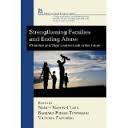
Strengthening families of different varieties and ending abuse in the myriad forms through which it surfaces is God’s way of bringing peace and safety to Christian homes across the world. This book is a challenge to congregations, their leaders, and the members who faithfully support them to consider their personal role in bringing this vision into reality.